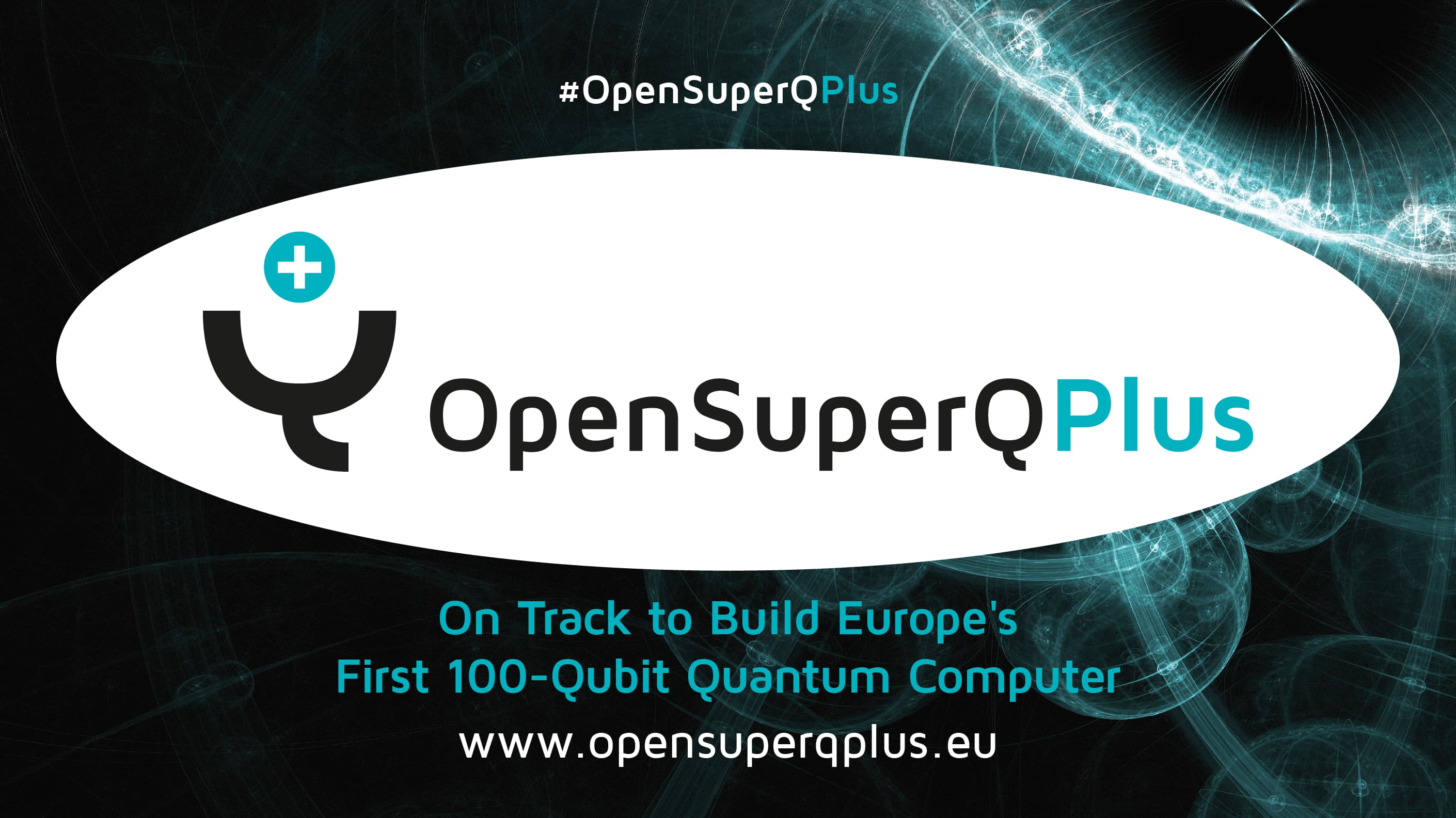OpenSuperQPlus: On Track to Build Europe's First 100-Qubit Quantum Computer
The European Quantum Flagship project OpenSuperQPlus (OSQ+) unites over 30 partners from academia, research and industry with a common mission: to design and build scalable, reliable superconducting quantum systems made in Europe. In the first phase, the project team aims to produce three quantum computing demonstrators at three leading institutions – Delft University of Technology (TU Delft), Chalmers University of Technology (Chalmers), and the Walther Meissner Institute (WMI). The number of qubits envisioned for each demonstrator varies, with the most ambitious goal being 40 qubits by September 2025, and at least one demonstrator is expected to reach 100 high-quality qubits by mid-2026. Beyond this milestone, the project seeks to boost European technological sovereignty in the field by enhancing the performance of its systems by 2030.
Three Quantum Computing Demonstrator Sites
The system developed at TU Delft shows impressive progress toward the 100-qubit milestone. The research team has released two prototypes into the cloud: the ‘Starmon-7’ quantum processor (https://qutech.nl/2025/02/25/quantum-inspire-2-0-is-live-with-updated-software-and-hardware/) and the open-architecture quantum computer ‘Tuna-5’ (https://qutech.nl/2025/05/15/delft-quantum-ecosystem-launches-open-architecture-quantum-computer/). These systems are designed as robust, foundational building blocks with a scalable architecture, emphasizing long-term reliability and growth, thus serving as a blueprint for future expansion of TU Delft and the wider Dutch quantum ecosystem.
Meanwhile, the demonstrators under development at Chalmers and WMI, which currently operates a 17-qubit quantum processor within the Munich Quantum Valley Ecosystem (https://www.munich-quantum-valley.de), are making important contributions to the project’s technical knowledge base. Their work on superconducting qubit technologies feeds into collaborative discussions across the consortium and may serve as a valuable platform for future national quantum computing initiatives.
All these achievements show a strong foundation for further expansion in the second phase of the OSQ+ project.
Scaling Up: Finnish and German Expertise in Qubit Quantity
Within the OSQ+ consortium, Finnish partners bring vital expertise in scaling up quantum hardware. In 2024, VTT Technical Research Centre of Finland (VTT) and IQM Finland (IQM) successfully launched Europe’s first 50-qubit quantum computer (https://www.vttresearch.com/en/news-and-ideas/vtt-and-iqm-launch-first-50-qubit-quantum-computer-developed-europe). Already in operation, the system is used to test quantum algorithms and address real-world industrial problems.
Another key contribution comes from Arctic Instruments (https://arcticinst.io/), a VTT spin-off, which has commercialised travelling wave parametric amplifier (TWPA) technology developed within OSQ+. This amplifier significantly enhances qubit readout signals – a critical component for systems aiming to reach 1,000 qubits.
VTT and Fraunhofer EMFT are making major strides in quantum chip manufacturing, moving closer to large-scale production.
VTT has developed a new method, the NAPA qubit process, that can reliably produce high-performance qubits across full wafers, without relying on slow, lab-based techniques. This approach uses a naturally formed aluminum oxide layer to protect qubits. Thanks to this technique, which is ready for industrial-scale use, the qubits are more durable and consistent.
Meanwhile, Fraunhofer EMFT has demonstrated that scalable quantum chips can be built using only standard industry tools on large (200 mm) wafers. Their process has shown high yields and long qubit lifetimes (T1 times up to 200 µs), key steps toward mass-producing quantum processors.
Raising the Bar: Testing Qubit Quality Across Europe
While quantity matters, qubit quality is equally crucial. In 2024, OSQ+ partner Orange Quantum Systems (OrangeQS) delivered test racks to Aalto University in Finland (https://orangeqs.com/news/osqp_orangeqs_rack_aalto_university/) and Karlsruhe Institute of Technology (KIT) in Germany (https://orangeqs.com/news/OSQP_orangeqs_rack_KIT/). Both sites began coherence testing of qubits within a single day of setup – demonstrating not only the robustness of the technology but also the strength of Europe's cross-border collaboration.
These Dutch-Finnish and Dutch-German test benches validate the interoperability of control electronics across institutions, thanks to the open-source Quantify framework. They represent a crucial step towards verifying qubit performance at the scale required for 100-qubit demonstrators. Furthermore, they reflect the OSQ+ commitment to building a European quantum technology ecosystem capable of developing and testing advanced quantum components across national borders.
Showcasing Progress at the SQA Conference in Delft
From 25 to 28 August 2025, OSQ+ will take centre stage at the Superconducting Qubits and Algorithms (SQA) conference in Delft (https://www.sqa-conference.org/). Co-organised by QuTech/TU Delft, OrangeQS and IQM, with OSQ+ as a platinum sponsor, the event will bring together experts from science and industry to explore the future of superconducting quantum computing.
OSQ+ will contribute a dedicated session on ‘Quantum benchmarking, calibration and standardisation’ – expanding on a discussion started at the 2024 ReAQCT conference in Budapest (https://www.reaqct.org/). The scientific conference committee is led by host QuTech/TU Delft. Additionally, several OSQ+ experts are involved, including the project’s coordinator Prof. Frank Wilhelm-Mauch (Forschungszentrum Jülich – FZJ) and Prof. Stefan Filipp (WMI). On the opening day of the conference, Prof. Wilhelm-Mauch and Dr Alessandro Bruno (QuantWare) will join Prof. David DiVincenzo for a live Q&A session open to the audience. They will discuss pressing questions about superconducting qubit technology.
Additional conference talks by OSQ+ researchers include:
- Quantum Algorithms – Dr Klaus Liegener (WMI)
- Quantum Benchmarking, Calibration and Standardisation – Prof. Kristel Michielsen (FZJ)
- Coupling and Modelling of Superconducting Qubits – Dr Max Werninghaus (WMI)
- Quantum Control and Enabling Technologies – Anurag Saha Roy (Qruise)
- Full-Stack Systems, Quantum Gates and Readout – Prof. Leo DiCarlo (QuTech/TU Delft)
Moreover, hands-on workshops by OSQ+ partners Zurich Instruments, OrangeQS and QuantWare will provide attendees with the opportunity to engage directly with cutting-edge tools and techniques.
One of the conference’s highlights will be a guided tour of the QuTech institute, led by OSQ+ member Dr Vivek Sinha (QuTech/TU Delft). Participants will have the rare opportunity to visit one of the most advanced OSQ+ demonstrators and learn about its current status, recent progress, and the challenges that lie ahead on the path to 100 qubits.
Find out more about the OSQ+ demonstrator in Delft from Dr Vivek Sinha himself:
https://opensuperqplus.eu/videos/OSQ-Plus_Interview_05_VS.mp4
Registrations for the SQA Conference are open until 18 August 2025:
https://www.aanmelder.nl/sqaconference/registration
